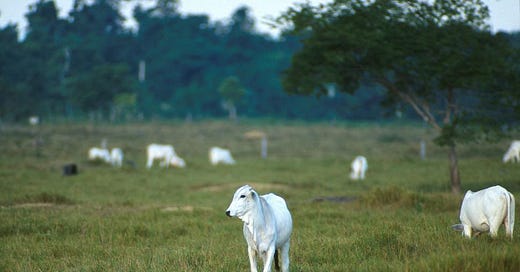If you’re looking to live more sustainably and reduce your carbon footprint, you may have heard the pronouncement: “A vegan diet is probably the single biggest way to reduce your impact on planet Earth…”
The data come from a 2018 Oxford study that looks at the environmental impact of the entire food supply chain, including factors such as greenhouse gas emissions, land use, and freshwater depletion.
This study has been crucial for emphasizing the importance of plant-based lifestyles as a solution to the climate crisis, but it’s not necessarily the answer people want to hear.
Do we really all have to switch to veganism?
It is undeniable that the meat and dairy industries are catastrophic for the environment. Together, they account for 14.5% of global greenhouse gas emissions, more than the entire transportation sector.
We’ve probably all heard that cows burp methane, a potent greenhouse gas, but the meat and dairy industries also produce significant amounts of CO2 from land-use change and farming equipment, and nitrous oxide(N2O) from manure and fertilizer.
Cattle in particular, and especially those raised in the Amazon, have a high environmental impact. Some experts have compared Amazon-raised beef to coal-fired power plants.
Meat and dairy also require a significant amount of water. A single pound of beef takes about 1,800 gallons of water to produce, while one pound of cheese takes 382 gallons.
Cattle require a large amount of food and pasture, so most of that water goes toward growing feed for the livestock. If we went vegan, it could go directly toward growing human food, vastly improving water efficiency.
There’s also the ethical argument for veganism. In the U.S. specifically, we rely on factory farming for most of our meat, dairy, and eggs, a system that is widely criticized for being inhumane.
In comparison, a vegan diet fosters a more humane lifestyle and reduces an individual’s greenhouse gas emissions, water pollution, and land use by 75%. It also decreases water use by 54%.
According to an IPCC report, if everyone on the planet switched to veganism, we could prevent almost 8 billion tons of CO2 from reaching the atmosphere by 2050. Much of this is due to the fact that vegan food sources require less land, freeing up more space for forests and grasslands that remove atmospheric CO2.
These dietary changes would be most impactful in North America, where our consumption of red meat, eggs, dairy, and poultry is much higher than the rest of the world and than the recommendations of climate experts.
But is a switch to veganism actually feasible?
Access to fresh fruits and vegetables, whole grains, and vegan proteins can be difficult in some communities. While beans and rice are often cheap and accessible, it can still be hard to eat a balanced diet, especially in low-income areas and food deserts.
And adopting a plant-based diet is not always as simple as swapping out meat and dairy for vegan versions. Many culturally significant foods call for meat, eggs, or dairy. It can be difficult to share meals with family members or partake in cultural traditions while vegan.
But I think the biggest reason people balk at the idea of veganism is that it just doesn’t appeal to them. They enjoy meat, dairy, and eggs – they don’t want to give them up. And that’s fine too.
A diet may be sustainable for the planet, but not sustainable for you personally. And if you don’t really want to do something it will be exceptionally difficult to see it through.
Luckily, it’s not just veganism that can make a positive environmental impact.
A global shift to vegetarianism (which still includes dairy and eggs) could offset 6 billion tons of CO2 by 2050, and even a shift to healthier eating (less meat, more fruits and vegetables) could save 4.5 billion tons of CO2.
Personally, I eat mostly vegetarian, getting my protein from eggs, tofu, legumes, and vegan meat substitutes. I eat some dairy (mainly Parmesan cheese and ice cream if I’m being honest), but I try to stick to plant-based milks. And I will sometimes eat fish, whether it’s a much-needed tuna packet on a backcountry expedition or an occasional sushi craving.
I’m definitely not vegan, and my diet is not perfect for the health of the planet. But it’s sustainable for me and I try to be cognizant of how my lifestyle impacts the environment.
As we head toward an uncertain future with more people, less available land, and ever-increasing carbon emissions, I hope everyone makes an effort to eat more sustainably. Whether that’s a decrease in meat consumption or a full switch to veganism, our food choices can have a profound impact on our planet.




